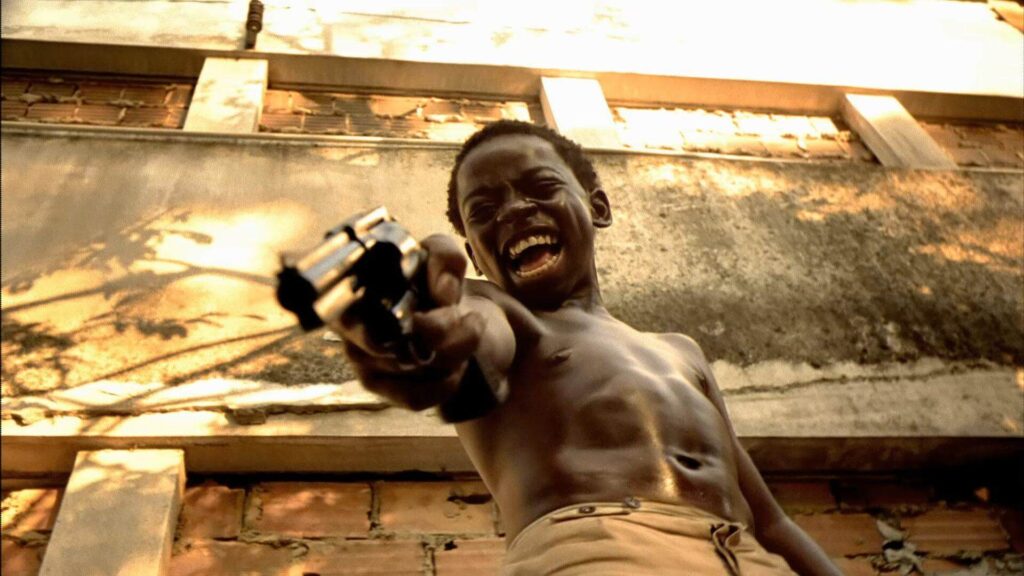Where to Watch:
9.7/10
FilmFascination Rating
It’s been a while since I wrote a review—I know, I’ve been missing. And yes, in case you’re wondering, I’m still watching movies. I always have, always will. But the truth is, I hadn’t come across a film that deserved a spot on the Great Movies list. I’ve always believed this list should be sacred—reserved only for those rare, powerful films that don’t just entertain, but overwhelm. So, instead of forcing a new entry, I found myself returning to a film that had deeply moved me the first time I saw it: City of God (Cidade de Deus). Back then, I knew it belonged here. I just never got around to writing about it. Until now.
City of God is one of the most electrifying, emotionally intense, and visually captivating films ever made. It is chaotic, relentless, and deeply unsettling—and that’s exactly why it works. What’s more haunting is that it’s based on a true story. The film throws us into the heart of Rio de Janeiro’s slums—specifically a favela named Cidade de Deus—where systemic poverty, hunger for power, and a total disregard for human life spiral into brutal violence. What’s most shocking is how young the participants are—kids carrying guns, kids committing crimes, kids losing their innocence before they’ve even had a chance to understand it. In this madness, we meet Rocket, our narrator and protagonist, who wants nothing to do with the gang wars or the thirst for control. He dreams of becoming a photographer. He’s observant, sincere, and most importantly, he’s afraid—afraid of getting shot, afraid of losing himself to a system that swallows children whole. And from the very first few minutes of the film, you understand why. Bullets fly down alleys like mosquitoes, blood paints the streets, and death is so casual it becomes part of the backdrop. People die just because they were standing in the wrong place at the wrong time.
There’s a scene where the police kill an innocent worker who ran in fear, then place a gun in his hands to fabricate a story. That one moment captures the twisted logic of survival in Cidade de Deus. Justice is meaningless, and power is everything. The film charts the evolution of the gangs—from small-time thieves to child warlords—each fighting to control turf, drugs, and reputation. But it’s not just the story that makes City of God exceptional—it’s how it’s told. The film’s editing is, without exaggeration, a masterclass. The non-linear storytelling spans decades and characters, but never loses its grip on clarity. It jumps between moments, rewinds to show you what you missed, fast-forwards to spare you what you don’t need, and lands with absolute precision where it matters. There’s a sequence where the entire history of a single apartment is told in a montage so brilliantly constructed that I had to pause and admire it. I honestly can’t think of another film where editing alone carries so much narrative weight and adds so much velocity to the storytelling.


Oddly enough, despite its violence, the film is undeniably beautiful. The cinematography is raw and immersive. The use of handheld cameras, close-ups, and high-speed chase shots doesn’t just create tension—it drops you into the world. You don’t watch City of God. You experience it. It feels like you’re running alongside these kids, hiding in corners, flinching at every shot fired. The film opens with a scene so frenetic—chickens running, knives clashing, music pounding—that you know right away the director is in complete control of the chaos. That level of confidence carries through till the last frame. Fernando Meirelles, the man behind the lens, deserves endless credit. His direction is bold, unflinching, and wildly ambitious. And perhaps most impressively, most of the cast weren’t even trained actors. Yet they deliver performances so natural, so lived-in, you forget you’re watching a film. You feel like a hidden observer in a brutal documentary. It’s raw cinema in its purest form.
Rocket, as the narrator, is another genius choice. Because he’s not part of the violence, he gives us an unbiased lens through which to understand the events. He introduces characters without glorifying or villainizing them. He’s not unreliable like Teddy Daniels in Shutter Island or manipulated like Cobb in Inception. He’s simply a witness. And in a world filled with distortion, that honesty is rare and powerful. Through his eyes, we don’t choose sides. We simply absorb the devastation.
City of God is one of the best films I have ever seen. It deserves every bit of praise it has received over the years. It is a reminder that great cinema isn’t just about scale or spectacle. Sometimes, it’s about telling the hardest stories in the most unforgettable way. If you haven’t seen it yet, I urge you—add it to your watchlist right now. You will not come out of it the
Join the FilmFascination Club!
All the updates right in your Inbox! (We will never spam you with junk mails)
You will get a message on the top of the form once your subscription is successful.


Is a ‘perfect’ movie rating system even possible—or does it kill the magic of film?